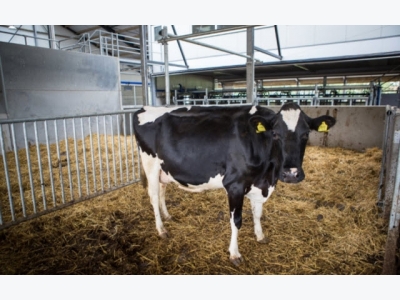Fighting uterine diseases with microparticles

A new biological treatment could prevent dairy cattle from getting uterine diseases, researchers from the University of Florida found. Uterine illnesses make cows infertile and reduce milk production.
At the University’s Institute of Agricultural and Food Sciences (IFAS), researchers took their experiments from lab to Alliance Dairy, a commercial farm in Gilchrist County. The researchers infused chitosan microparticles – an antimicrobial material made of dissolved shrimp shells – into diseased cow uteri.
They found that chitosan decreased multiple pathogenic bacteria, including Fusoscobacteria necrophorum, in the uterus and therefore, cured metritis, an inflammation in the uterus.
Team lead Kwang Cheol “KC” Jeong, an assistant professor in the UF/IFAS animal sciences department explains: “We did follow-up experiments in animals to cure the disease, which is very important. It’s a critical advance because most lab data are not repeated in real-world situations. However, our work showed that chitosan micro-particles can be translated into clinical treatment for animals and even for humans.”
When bought in stores, chitosan can be used to treat many ailments, from obesity to anemia. On its own, chitosan only works at acidic pH levels, Jeong said. For cattle, Jeong’s team developed chitosan microparticles, which work in acidic and neutral pH, because cattle uteri have a neutral pH.
The latest study’s findings suggest chitosan microparticles kill bacteria in the uteri, he said. Jeong said it may someday be possible for chitosan microparticles to be used to help humans who have become ill from consuming E. coli-contaminated food, but more research is needed.
The new study is published in the journal Biomaterials.
Source: IFAS
Có thể bạn quan tâm
 Bypass protein for high producing dairy cows
Bypass protein for high producing dairy cows Dairy cows use microbial protein, coming from the rumen, Protein products, based on soy and rapeseed can be a cost-effective way
 The use of seaweed extract in cattle feed
The use of seaweed extract in cattle feed Seaweed, whether they are green, red or brown, are an abundant, under-used resource in helping reducing the use of antibiotics.
 Boosting immunity for prevention of ketosis
Boosting immunity for prevention of ketosis A healthy start of the lactation is required for good milk production and reproduction. Unfortunately, dairy cattle show increased incidence of both metabolic